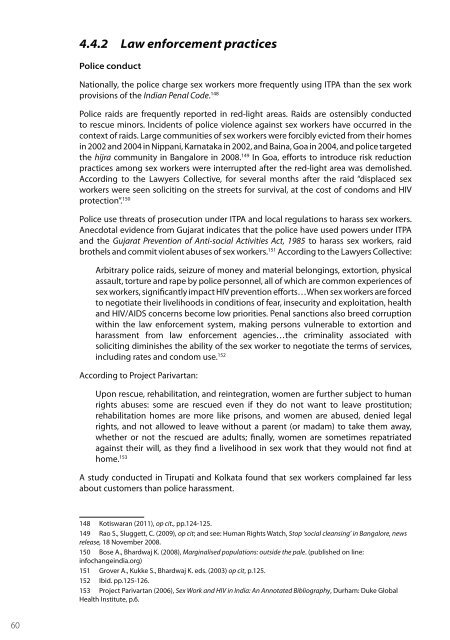SEX WORK AND THE LAW - HIV/AIDS Data Hub
SEX WORK AND THE LAW - HIV/AIDS Data Hub
SEX WORK AND THE LAW - HIV/AIDS Data Hub
Create successful ePaper yourself
Turn your PDF publications into a flip-book with our unique Google optimized e-Paper software.
4.4.2 Law enforcement practices<br />
Police conduct<br />
Nationally, the police charge sex workers more frequently using ITPA than the sex work<br />
provisions of the Indian Penal Code. 148<br />
Police raids are frequently reported in red-light areas. Raids are ostensibly conducted<br />
to rescue minors. Incidents of police violence against sex workers have occurred in the<br />
context of raids. Large communities of sex workers were forcibly evicted from their homes<br />
in 2002 and 2004 in Nippani, Karnataka in 2002, and Baina, Goa in 2004, and police targeted<br />
the hijra community in Bangalore in 2008. 149 In Goa, efforts to introduce risk reduction<br />
practices among sex workers were interrupted after the red-light area was demolished.<br />
According to the Lawyers Collective, for several months after the raid “displaced sex<br />
workers were seen soliciting on the streets for survival, at the cost of condoms and <strong>HIV</strong><br />
protection”. 150<br />
Police use threats of prosecution under ITPA and local regulations to harass sex workers.<br />
Anecdotal evidence from Gujarat indicates that the police have used powers under ITPA<br />
and the Gujarat Prevention of Anti-social Activities Act, 1985 to harass sex workers, raid<br />
brothels and commit violent abuses of sex workers. 151 According to the Lawyers Collective:<br />
Arbitrary police raids, seizure of money and material belongings, extortion, physical<br />
assault, torture and rape by police personnel, all of which are common experiences of<br />
sex workers, significantly impact <strong>HIV</strong> prevention efforts…When sex workers are forced<br />
to negotiate their livelihoods in conditions of fear, insecurity and exploitation, health<br />
and <strong>HIV</strong>/<strong>AIDS</strong> concerns become low priorities. Penal sanctions also breed corruption<br />
within the law enforcement system, making persons vulnerable to extortion and<br />
harassment from law enforcement agencies…the criminality associated with<br />
soliciting diminishes the ability of the sex worker to negotiate the terms of services,<br />
including rates and condom use. 152<br />
According to Project Parivartan:<br />
Upon rescue, rehabilitation, and reintegration, women are further subject to human<br />
rights abuses: some are rescued even if they do not want to leave prostitution;<br />
rehabilitation homes are more like prisons, and women are abused, denied legal<br />
rights, and not allowed to leave without a parent (or madam) to take them away,<br />
whether or not the rescued are adults; finally, women are sometimes repatriated<br />
against their will, as they find a livelihood in sex work that they would not find at<br />
home. 153<br />
A study conducted in Tirupati and Kolkata found that sex workers complained far less<br />
about customers than police harassment.<br />
148 Kotiswaran (2011), op cit., pp.124-125.<br />
149 Rao S., Sluggett, C. (2009), op cit; and see: Human Rights Watch, Stop ‘social cleansing’ in Bangalore, news<br />
release, 18 November 2008.<br />
150 Bose A., Bhardwaj K. (2008), Marginalised populations: outside the pale. (published on line:<br />
infochangeindia.org)<br />
151 Grover A., Kukke S., Bhardwaj K. eds. (2003) op cit, p.125.<br />
152 Ibid. pp.125-126.<br />
153 Project Parivartan (2006), Sex Work and <strong>HIV</strong> in India: An Annotated Bibliography, Durham: Duke Global<br />
Health Institute, p.6.<br />
60
















